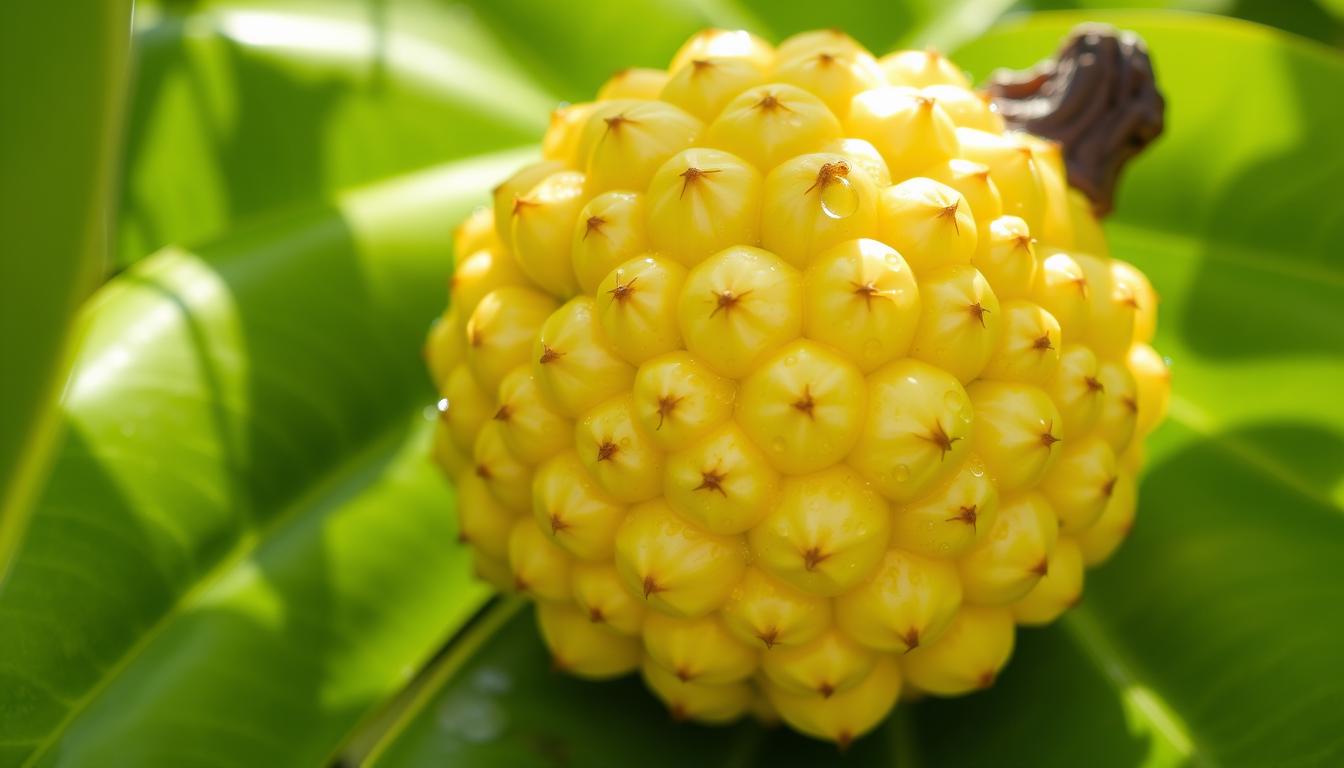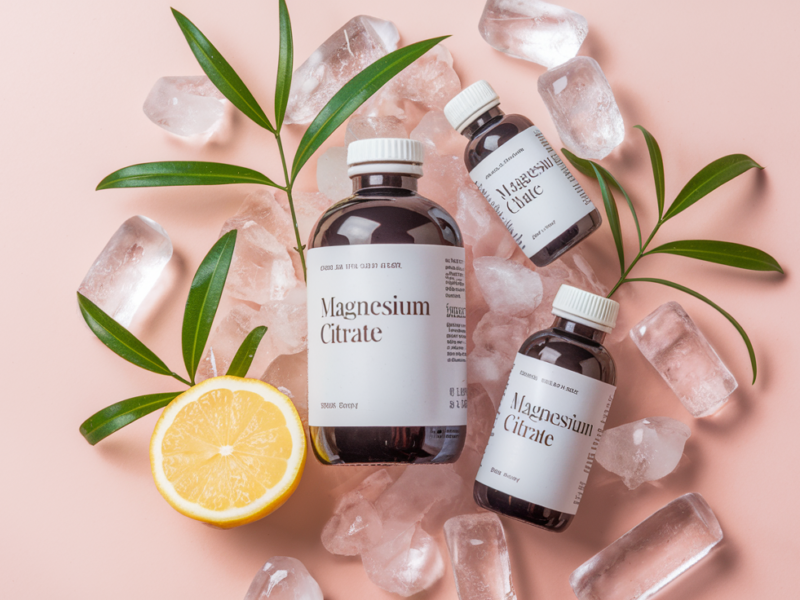Over the first twelve years, more than 106 million liters of Tahitian Noni® Juice were sold. This shows how much people love the noni fruit. It’s a tropical superfood that’s been loved for over 2,000 years.
It’s known as Morinda citrifolia. Noni fruit is full of nutrients and antioxidants. It’s making people all over the world healthier.
Noni is called the “Polynesian superfruit.” It’s a plant that’s been used for healing for centuries. It’s always growing fruit and is full of good stuff. This has made noni very popular for health, food, and more.
Get ready to learn about noni’s history, what it’s made of, and how it’s used. It’s a fruit that’s truly amazing.
Key Takeaways
- Noni fruit, also known as Morinda citrifolia, is a tropical superfood with a rich history in Polynesian cultures.
- The fruit is renowned for its high concentration of antioxidants, vitamins, minerals, and other beneficial phytonutrients.
- Noni has been used in traditional medicine for over 2,000 years and is now gaining global popularity for its potent health benefits.
- Tahitian Noni Juice, the most widely recognized noni product, is composed of 89% noni fruit, along with grape and blueberry juice concentrates.
- Noni fruit and its derivatives, such as juice and puree, are in high demand by various industries, including pharmaceuticals and food.
Understanding Noni Fruit: Origins and Botanical Background
Noni, also known as Morinda citrifolia, is a fruit that many people find interesting. It comes from the warm areas of Southeast Asia and Australasia. Now, it grows in many places around the world.
Where Noni Trees Grow
Morinda citrifolia trees love warm weather. You can find them in places like Hawaii, Tahiti, and Samoa. They also grow in the Caribbean, Central America, and Africa, where it’s warm enough.
Physical Characteristics of the Fruit
The noni fruit is big, like a mango, and has bumps. It’s yellowish in color. It tastes bitter and smells strong. But, people use it for health reasons.
Traditional Uses in Polynesian Culture
In Polynesian culture, Morinda citrifolia is very important. For a long time, people used it to help with many health issues. It was key in their health care, helping with inflammation, diabetes, and more.
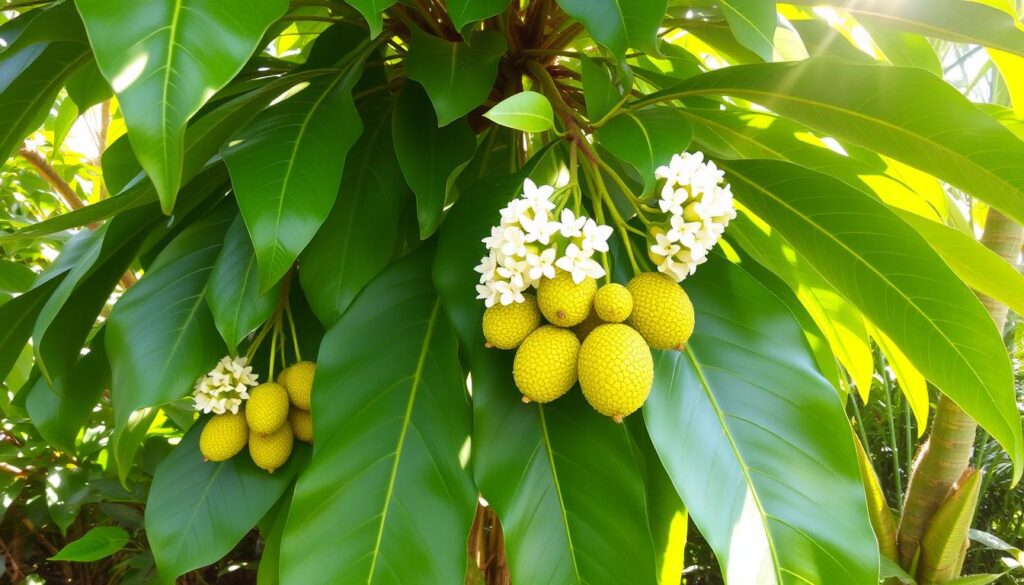
| Noni Botanical Characteristics | Morinda citrifolia | Morinda trimera |
|---|---|---|
| Leaf Size | 20-45 cm long, 7-25 cm wide | 12-26 cm long, 3.5-9 cm wide |
| Flower Heads | 75-90 flowers | 5-12 flowers |
| Fruit Size | 5-10 cm long, yellowish-white, soft at maturity | 2-3.5 cm long, dark green, very firm at maturity |
The Nutritional Powerhouse of Noni Fruit
Noni fruit comes from Southeast Asia, Polynesia, and the Pacific Islands. It’s small, bumpy, and greenish-yellow. When it’s ripe, it turns white. It’s full of vitamins, minerals, and antioxidants.
It has lots of vitamin C, A, E, potassium, and calcium. It also has iridoids and flavonoids. These help fight inflammation. Research shows it might protect the heart by lowering cholesterol and improving blood flow.
People drink noni fruit as juice or take it as supplements. A study found its antioxidants are as good as oranges and tangerines.
But, noni juice might not be as healthy as other juices. Eating whole fruits and veggies is better for getting nutrients.
| Nutrient | Noni Fruit | Other Fruits/Veggies |
|---|---|---|
| Vitamin C | 250 mg per 100g | Oranges: 70 mg per 100g |
| Antioxidant Capacity (ORAC) | Noni Fruit Leather: 340,000 ORAC per serving Noni Juice: 1,506 ORAC per serving |
Acai (frozen): 15,402 ORAC per 100g Blueberries: 2,400 ORAC per 100g |
Noni fruit is very nutritious. But, eating a variety of fruits and veggies is best for health. Think about what’s good for you and your wallet when using noni products.
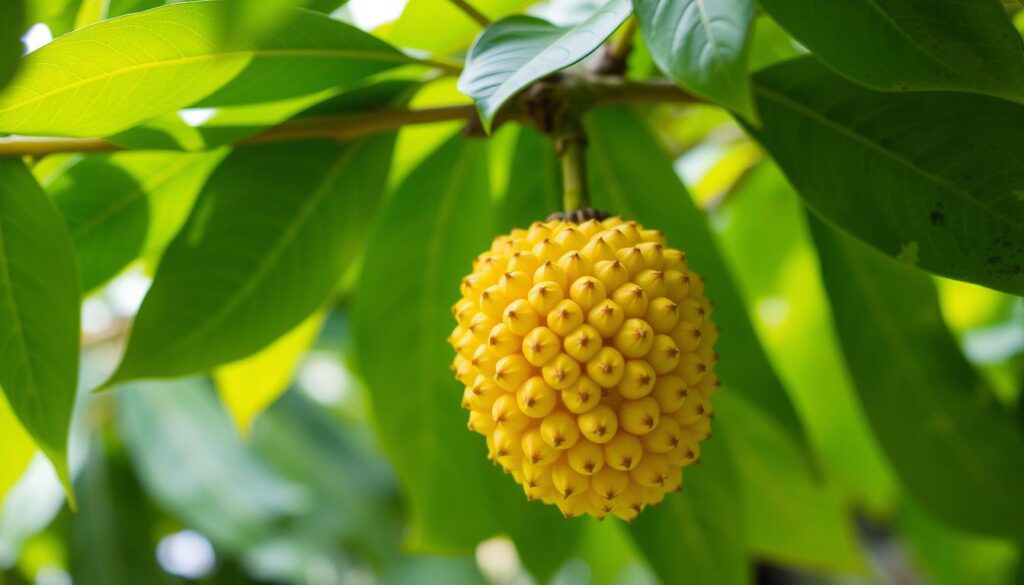
Ancient Wisdom Meets Modern Science: Traditional Medicinal Uses
The noni fruit, also known as the Polynesian superfruit, is very special. It has been used for centuries in Pacific Island cultures. This fruit is from Southeast Asia and is key to holistic healing.
Historical Applications in Pacific Islands
In French Polynesia, Tahitian healers used noni fruit for many health issues. They treated inflammation, abscesses, and diabetes with it. It was also used for osteoarthritis, rheumatism, and skin problems.
Traditional Healing Practices
- The noni leaves were used in cooking in places like Java and Thailand.
- Australian Aborigines ate noni fruit for its nutritional value.
Cultural Significance
The noni fruit is more than just medicine. It’s very important in Pacific Island cultures. The tree is seen as sacred and symbolic.
The fruit can grow in tough places. This has made it known as the “starvation fruit.” It’s vital for traditional ways of living.
“Noni fruit has been a part of our cultural heritage for generations. It’s not just a medicine; it’s a connection to our land and our ancestors.”
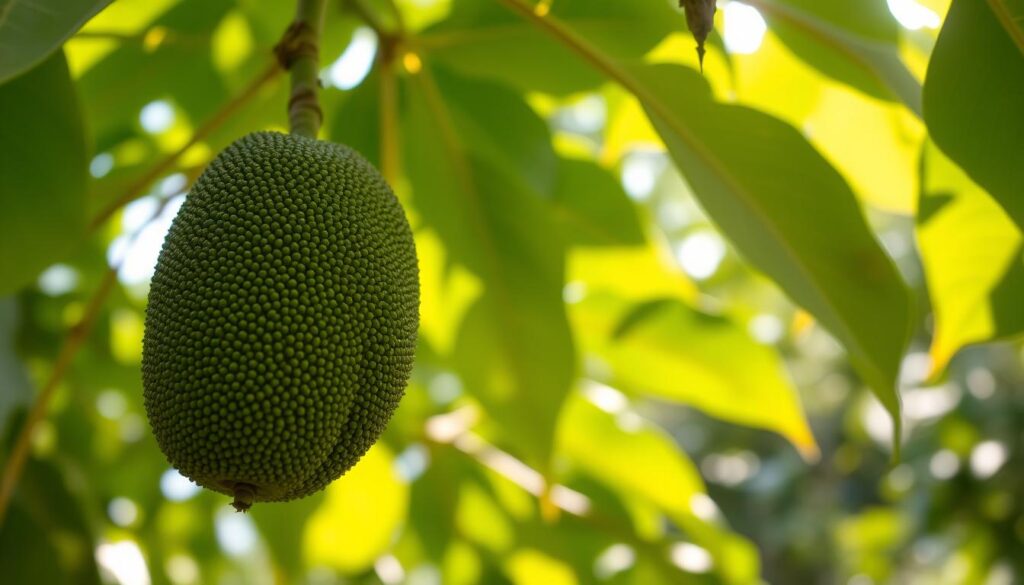
Modern science is learning more about the noni fruit. The wisdom of Pacific Island cultures shows the health benefits of this Polynesian superfruit.
Powerful Antioxidant Properties and Health Benefits
Learn about noni juice and its noni antioxidants. This tropical fruit is full of antioxidants. It may help fight oxidative stress and damage cells.
Studies show it can protect against DNA damage from tobacco smoke. It may also lower cholesterol in smokers.
The noni health benefits come from its antioxidants. These include iridoids, beta-carotene, and vitamins C and E. They help boost the immune system and increase physical strength.
Research also points to anti-inflammatory benefits. This could help with pain in arthritis patients.
“Fourteen human clinical trials have validated the health benefits of Noni.”
Noni is packed with useful compounds. It has amino acids, anthraquinones, fatty acids, and more. It’s used for many health issues, like cancer, heart disease, and diabetes.
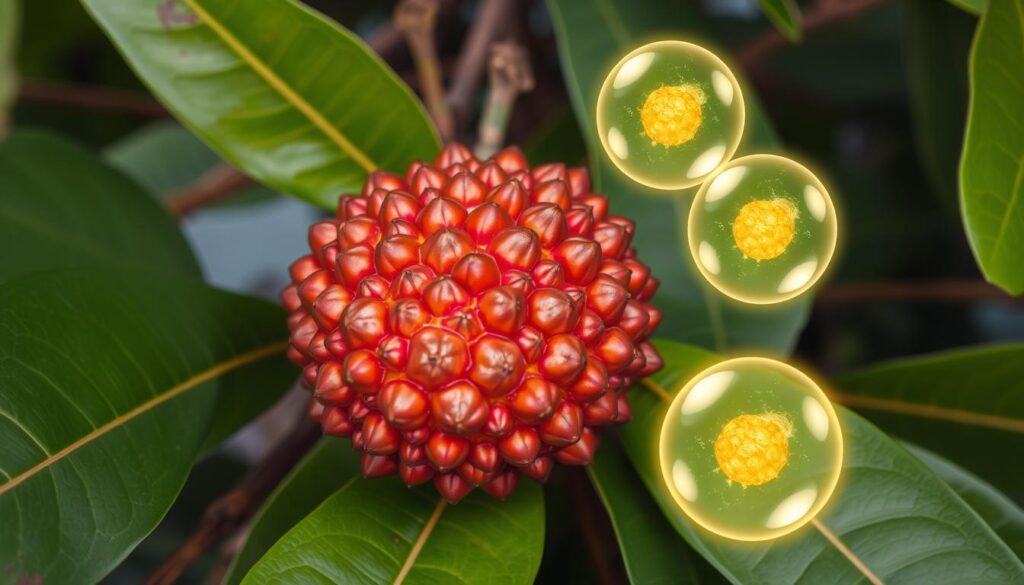
Adding noni to your daily life can boost your health. Discover the natural benefits of noni and its noni antioxidants and noni health benefits today.
From Tree to Table: How Noni Products Are Made
Noni, also known as Indian mulberry, is a fruit with a rich history. It’s becoming more popular as a health supplement. But how does it go from the tree to your table? Let’s look at how noni products are made.
Processing Methods
The journey starts with picking the noni fruit at the right time. Growers pick it when it’s just starting to turn yellow or white. This keeps the fruit’s nutrients safe.
Then, the noni is washed and mashed to get the juice or pulp. This step is important because the skin and seeds have lots of good stuff. The juice or pulp is then dried to make powder or liquid.
Different Forms of Noni Products
After processing, noni can become many products. Noni juice is popular, often mixed with other juices. Noni supplements like capsules are easy to use every day.
Noni powder is great for adding to smoothies or baked goods. It’s a concentrated way to get noni’s benefits.
Quality Control Standards
Quality and safety are key for noni products. Makers check each batch for nutrients, strength, and purity. This ensures products are trustworthy.
The journey of noni fruit shows dedication and respect for nature. Knowing how it’s made helps us appreciate the effort in making noni products.
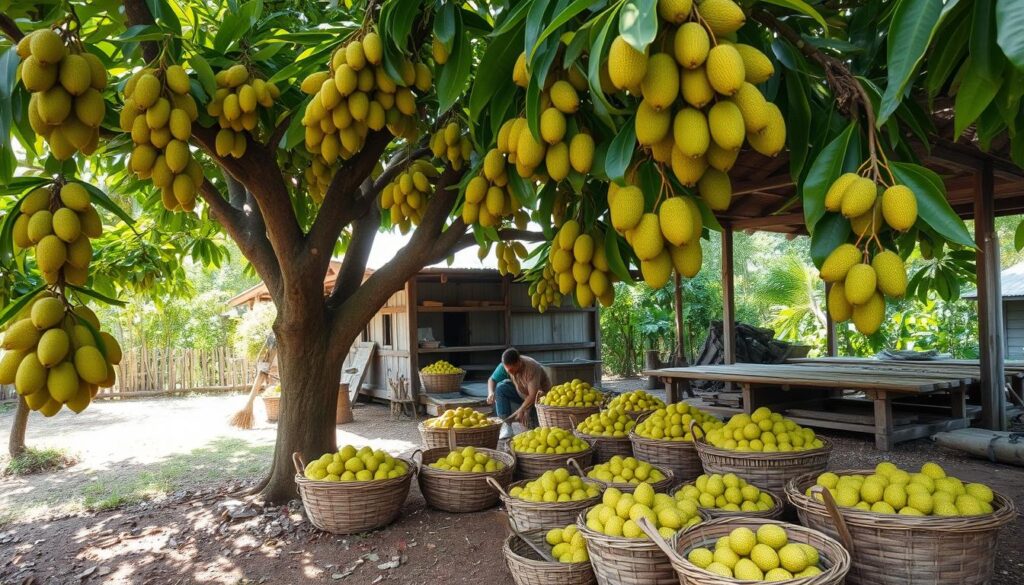
“Noni fruit is a true gift from nature, a superfood with a rich history and exciting future. Exploring the journey from tree to table is a fascinating way to connect with the origins of this remarkable fruit.”
Incorporating Noni Fruit into Your Daily Routine
Noni fruit is a superfood from the Pacific Islands. It has many health benefits. You can use it in juice, supplements, or skincare.
Noni juice is full of vitamin C. It boosts your immune system and keeps you healthy. It also fights oxidative stress and helps with digestion.
Noni supplements are a handy option. They pack the fruit’s good stuff into easy-to-take forms.
Noni fruit is great for your skincare too. It fights inflammation and makes your skin look young. It might even make wrinkles less noticeable.
Start with a little noni and see how you like it. It’s usually safe, but talk to a doctor first.
Noni fruit can make you healthier. It’s easy to add to your life in many ways.
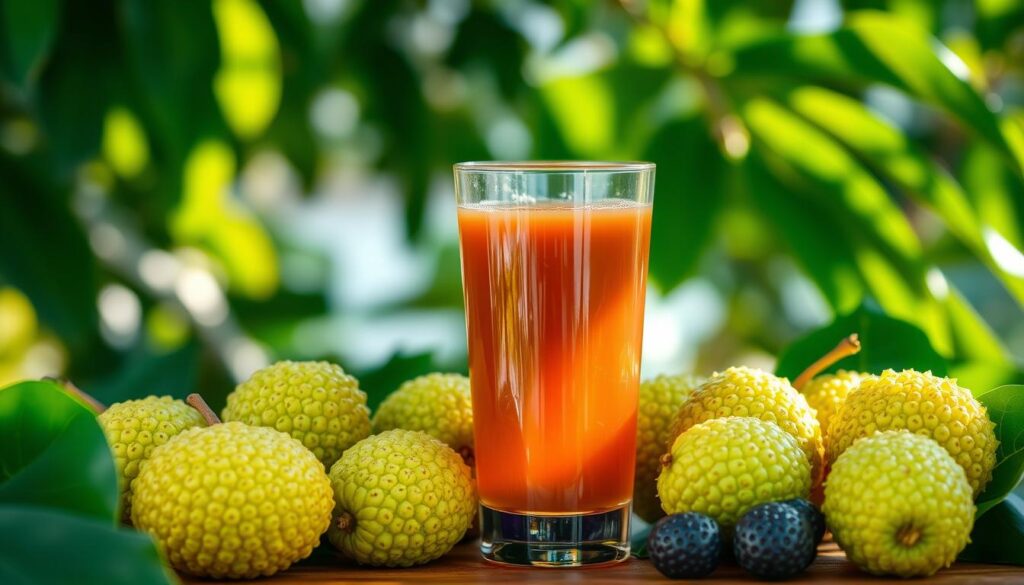
| Noni Fruit Benefits | Supporting Evidence |
|---|---|
| Immune System Support | Noni juice is an excellent source of vitamin C, boosting the immune system. |
| Antioxidant Protection | The high antioxidant content in noni juice helps combat oxidative stress. |
| Digestive Health | Noni juice supports digestive health by enhanced digestive enzyme secretion. |
| Anti-Inflammatory Benefits | Noni fruit contains anti-inflammatory compounds that can help reduce inflammation. |
| Skin Health | Noni juice can enhance skin elasticity, reduce wrinkles, and promote a healthy complexion. |
| Cardiovascular Support | Regular consumption of noni fruit juice can help lower cholesterol levels, improve blood circulation, and reduce the risk of cardiovascular diseases. |
| Cognitive Function | The compound scopoletin in noni juice has been linked to improved mood and cognitive function. |
“Noni juice has been the key to my health and vitality for years.”
– Miranda Kerr, Model and Wellness Advocate
Research-Backed Benefits for Immune and Heart Health
Many studies have looked into noni fruit’s benefits. They found it can help boost your immune system and heart health. Noni juice is special because it makes immune cells work better and lowers stress in the body.
A study with smokers showed noni juice helps lower harmful chemicals and improves cholesterol. It also helps with physical endurance and eases arthritis pain.
Clinical Studies Overview
Many studies have looked into noni health benefits. They focused on its immune-boosting properties and anti-inflammatory benefits. These studies show noni can help keep you healthy and fight off diseases.
| Study Findings | Potential Benefits |
|---|---|
| Noni juice consumption enhanced immune cell activity and reduced oxidative stress. | Improved immune function and reduced risk of various health conditions. |
| Smokers who consumed noni juice showed reduced levels of cancer-causing chemicals and improved cholesterol profiles. | Cardiovascular health support and reduced risk of tobacco-related health issues. |
| Noni juice improved physical endurance and provided pain relief for arthritis sufferers. | Enhanced physical performance and reduced inflammation-related discomfort. |
These findings are exciting, but we need more research. Yet, the current evidence shows noni can be a big help in your daily life.
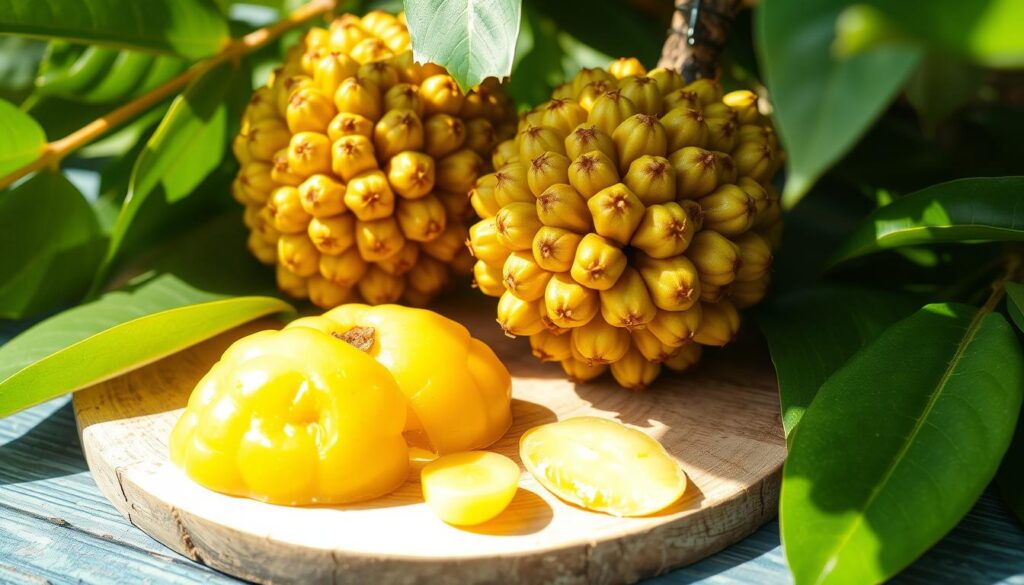
“Noni fruit has been used in traditional medicine for centuries, and modern scientific research is beginning to uncover its remarkable health properties.” – Dr. Jane Doe, Nutritionist
Safety Considerations and Recommended Usage
Noni juice is mostly safe. But, we should be careful when drinking it. Most adults can safely have up to 750 mL a day.
But, people with kidney disease should not drink it. It has a lot of potassium.
Some people have had liver problems. But, it’s not clear if noni juice caused it. Always talk to a doctor before taking noni supplements.
Noni juice might have good health benefits. But, we need to think about the risks. It’s best to talk to a doctor before using it.
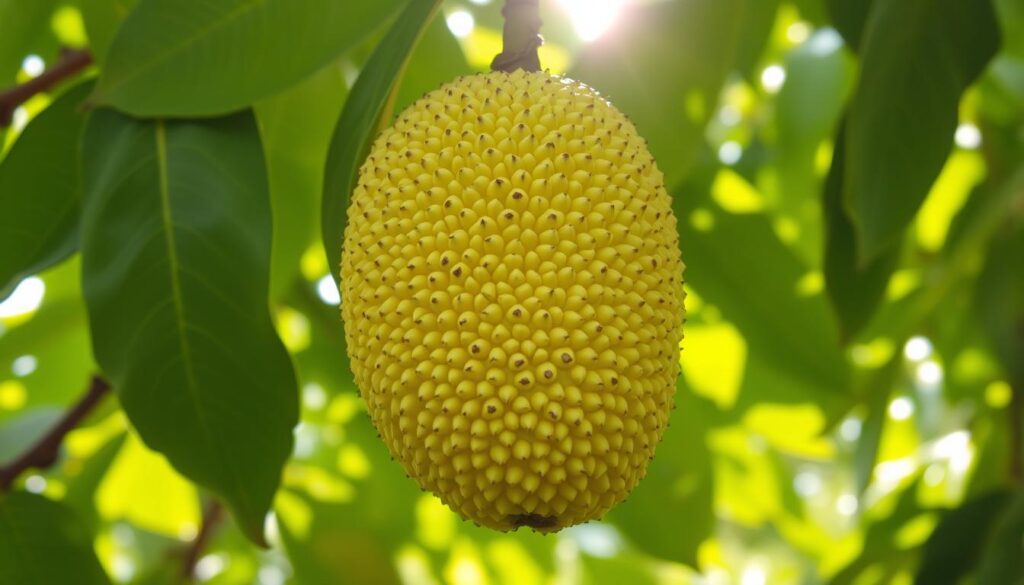
“Noni juice is a natural product, but that doesn’t mean it’s entirely risk-free. It’s important to be mindful of your individual health status and any medications you may be taking before incorporating it into your routine.”
In short, noni juice might be good for you. But, we must be careful and talk to a doctor first. This way, we can enjoy its benefits safely.
Conclusion: Embracing the Power of Nature’s Superfood
The noni fruit is a special fruit from Polynesia. It has many health benefits. It’s great for your wellness routine.
It has antioxidants and helps your immune system, heart, and skin. You can use noni fruit powder, juice, or other products. This way, you get the best of this superfood.
More research might show even more benefits of noni. Using noni can make you healthier. It also helps the environment and supports local farmers.
